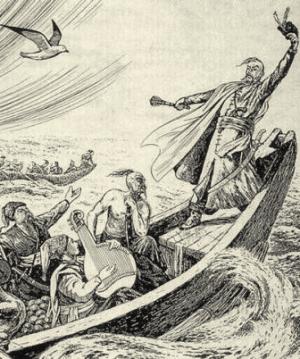|
Taras Shevchenko
HAMALIYA
("Hamaliya" / "Гамалія")
Translated by Vera Rich
"Ah, there comes, there comes nor wind nor a wave
From our Ukraina!
Whether they are in council, how to face the Turk —
We hear not in this far region!
Ah, blow, wind, blow, far over the sea,
From the Great Meadow coming,
Gome, dry our tears, drown the clanking of chains,
And scatter our longing.
Ah, dance, then, dance, thou azure-blue sea
Under boats where are sailing
The Cossacks (only their caps to be seen),
To this shore to save us.
Ah God, our God! Even if not for us, —
From Ukraine do Thou bear them :
We shall hear their glory, the Cossack glory,
Shall hear it and perish.”
Thus in Scutari the Cossacks were singing,
They sang, the poor souls, and fast their tears flowed,
The Cossack tears flowed, and spoke of their yearning,
Till Bosphorus trembled, for he, since his birth,
Had never yet heard the weeping of Cossacks;
Like a grey bull he quivered throughout his wide girth,
Sending the waves rolling far, far away,
Over his ribs and to the blue sea.
And roaring the words of the Bosphorus, the sea drove
His message to Lyman, and Lyman to Dnipro
Over its waves passed the sorrowing speech.
Our mighty grandsire roared with laughter,
Till his moustaches flowed with spume.
"Asleep? Or listening, Brother-Meadow?
Sister Khortytsya?" Echoes boomed
From Meadow and Isle: "I hear, I hear!"
Boats swarmed the Dnipro in a throng,
The Cossacks sang a rousing song:
"The Turkish Lady yonder has
A house with fine wood floor.
Hey! Hey ! Sea, dance and play!
Roar! Tear the cliffs away!
We’ll go as guests, for sure!
The Turkish Lady in her pockets
Thalers has and ducats.
Not to pick her pockets, no,—
But to knife and burn we go,
And to free our brothers!
The Lady janissaries has,
A pasha on a couch.
Ho! Ho! At the foe!
Qualm or quaver we don’t know:
Glory and freedom’s ours!"
Thus they sang while sailing on;
The sea the wild wind hears,
Hamaliya in the prow Directs them how to steer.
"Hamaliya! Valour’s fleeing!
The sea has grown enraged!"
"It shall not scare us!" And they hid
Beyond the mountain waves.
*****
In the harem, in paradise, slumbers Byzantium,
Scutari is slumbering; Bosphorus seethes,
Groaning and howling as it were a mad thing,
Wishing to rouse Byzantium from dreams.
"Rouse them not, Bosphorus, else you’ll be mourning!
All your white ribs I shall choke up with sand,
I shall bury in mud!" the blue sea is roaring.
"Do you not know what guests to the land
Of the Sultan I’m carrying?" Thus the sea grumbled,
(The bold long-must ached Slavs it loved dearly indeed).
Bosphorus took heed. The Lady still slumbered,
In the harem, the laggardly Sultan still dreamed.
In Scutari alone, in the prison, are awake
The poor Cossack lads. What are they watching for?
From their fetters they pray in words simple and straight,
And the roaring waves roll to the far, further shore.
"O God all-merciful of Ukraine!
Let not in foreign parts as slaves
Free Cossacks thus to perish, for
’Twere shame both now and evermore
To rise up from a foreign grave,
Come to Thy Judgment, just and right,
With hands in irons, and in the sight
Of all to stand in chains and fetters
Is shame for Cossacks! ...
— "Slash and smite!
Strike the faithless unbeliever!"
Beyond the wall. Whose is that cry?
"Hamaliya! Valour’s fleeing!
Scutari is enraged.
"Slash and smite! From the fort
He shouts in answer straight.
With cannon all Scutari’s roaring,
The foemen wildly roar and rage,
Reckless the Cossack host charge forward,
And janissaries tumble slain.
Hamaliya revels wildly
Through Scutari’s hell,
Tears the dungeon open wide,
Rends the chains himself.
"Fly forth, grey hawks, to the bazaar,
To take your share of wealth!"
The falcon chicks all started, for
So long it was they might
Not hear this Christian language spoken...
And old mother night
Started too, she had not seen
The Cossacks pay the score.
Do not fear — but look upon
The Cossack feast! Though all
Is murky like a common night
Yet this is no small feast, no
Not robbers these, who silently
With Hamaliya eat
Fat without mutton. "Let us have
Some light, boys!" And the flames
Mount cloud-high, with high-masted ships
Scutari is ablaze.
Now Byzantium blinked her eyes.
Roused herself from sleep,
Quickly sailed to bring them aid,
Sailed and gnashed her teeth.
Byzantium roars and rages wildly,
And with her hands she grasps the shore,
Grasps, yells and rises — and once more
In blood upon the knives grows silent.
Scutari’s like all hell ablaze,
Through the bazaars spilt blood is snaking,
To swell broad Bosphorus’s waves
Like dark birds in the wood this day,
The Cossacks fly from place to place,
Not a soul who can escape them,
The fire-hard ones, no flame can scathe them.
They tear the walls down; in their caps
The Cossacks bear off silver, gold,
Carry it off and fill the boats.
Scutari burns, the work dies down,
The lads assemble, gathered round,
Light their pipes there at the blaze;
To the boats! And they set out,
Shearing the red mountain-waves.
They sail, as if they came from home,
As if they sailed for pleasure,
And as they sail, as is their way,
The Cossacks sing together:
"Our good captain, Hamaliya,
— Bold and brave is he,
Gathered up his lads, departed
Off across the sea;
Off across the sea,
Famous he would be,
And from Turkish slavery, his
Brethren he would free.
Hamaliya to Scutari
Sailed across the water, —
Brother Cossacks sat in prison,
Waiting Turkish torture.
‘Brothers,’ Hamaliya shouted,
‘We shall live this day,—
We shall live, drink wine, and we
Shall janissaries slay,
On our barracks, carpets, velvet,
For a roof we’ll lay!'
Zaporozhians went a-reaping,
Flew into the meadow,
Reaped the rye and stacked the stooks,
And they sang together :
‘Glory to you, Hamaliya,
All the wide world over,
All the wide world over,
All through Ukraina,
For you’d not let your comrades perish
In a foreign region!'"
They sail on singing, Hamaliya
There behind them, bold, he sails,
As an eagle guards his eaglets;
The wind blows from the Dardenelles,
But Byzantium’s not pursuing:
She fears the Monk might be returning
To light Galata’s fires once more,
Or Hetman Ivan Pidkova call
Them out to sea again to skirmish.
They sail on...
From behind the waves,
Sun paints the waves with red;
Before them stretches the kind sea,
It murmurs and resounds.
"Hamaliya! Winds blow freely!
Soon our own sea again!"
And they were hidden in the waves,
Behind the living mountains.
|
|

